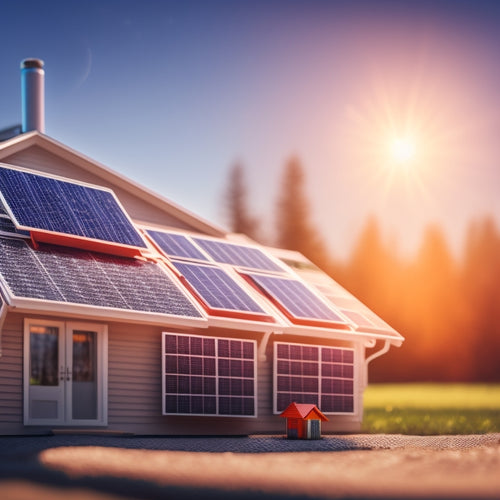
Off Grid Solar Batteries
Share
As you shift to off-grid living, you'll rely on high-performance solar batteries to store excess energy generated by your solar panels, ensuring a steady power supply even when the sun isn't shining. You'll want to choose a battery that aligns with your energy needs, considering factors like chemistry options, cycle life, and amp-hour rating. Lithium-ion batteries offer high efficiency and long lifespan, while flooded lead-acid batteries provide a cost-effective option. Understanding these factors will help you select the right battery for your system, and exploring the complexities of off-grid solar batteries will reveal more ways to optimize your energy independence.
The Essentials
- Off-grid solar batteries provide energy independence and reliable power supply during low solar irradiance or nighttime.
- Lithium-ion batteries offer high efficiency, long lifespan, and low maintenance, making them a popular choice for off-grid solar systems.
- Proper energy storage is crucial for uninterrupted power supply, allowing users to store excess energy and reduce reliance on the grid.
- Cycle life expectancy and depth of discharge (DOD) are key factors in selecting the right battery for off-grid solar systems.
- Longer cycle life batteries reduce maintenance and replacement needs, leading to cost savings and improved system reliability.
Renewable Energy Independence Guaranteed
You're looking for energy storage solutions that guarantee your independence from the grid.
With off-grid solar batteries, you can power your freedom by storing excess energy generated during the day for use at night or during power outages.
By utilizing renewable energy with efficient power storage solutions Renewable Energy Storage, you can reduce your reliance on the grid and lower your electricity bills.
Energy Storage Solutions
Your off-grid solar battery system's weakest link is often its energy storage solution, which can make or break your renewable energy independence. A reliable energy storage solution is vital to guarantee a steady supply of power, especially during periods of low solar irradiance or at night.
You need a solution that can store excess energy generated by your solar panels during the day and provide backup power when needed. With high-efficiency battery systems, such as lithium-ion batteries Renewable Energy Storage Solutions, you can enjoy a reliable and efficient energy storage solution that keeps you connected and in control.
Look for grid alternatives that offer energy resilience and sustainable living. Off-grid solutions with eco-friendly options can provide the energy efficiency you need.
Solar technology has come a long way, and renewable innovations have made it possible to store energy efficiently. When selecting an energy storage solution, consider self-sufficiency strategies that prioritize energy independence.
A good solution should be able to provide backup power for extended periods, guaranteeing your freedom from the grid is maintained. By choosing the right energy storage solution, you can enjoy uninterrupted power supply and live off the grid with confidence.
Powering Your Freedom
With renewable energy independence within reach, a dependable off-grid solar battery system is essential to powering your freedom from the grid.
You've made the decision to break free from the constraints of traditional energy providers, and now it's time to guarantee your off-grid lifestyle is supported by a sturdy energy storage solution.
By utilizing home battery storage solutions, you can reduce your reliance on the grid during power outages and lower your electricity bills by storing excess energy generated by your solar panels.
When it comes to solar panel integration, your off-grid solar battery system plays a critical role in utilizing and storing excess energy generated during the day for use at night or during periods of low sunlight.
This seamless integration guarantees you have a consistent and dependable source of power, even when the sun isn't shining.
Lower Monthly Energy Bills
You'll considerably reduce your energy consumption by utilizing free energy from the sun, which directly translates to lower monthly energy bills.
By integrating renewable energy systems into your off-grid solar battery setup, you'll not only decrease your reliance on the grid but also guarantee a reliable backup power solution.
With a well-designed solar battery system, you can expect to cut your energy expenses by a substantial margin.
Reduce Energy Consumption
The kilowatt-hour meter on your utility pole is a constant reminder of the energy consumption habits of your household. To reduce energy consumption and lower your monthly energy bills, you must adopt energy-efficient practices.
Start by replacing traditional incandescent bulbs with LED bulbs, which consume considerably less energy. Upgrade to smart appliances that are designed to optimize energy usage. These appliances are equipped with sensors that detect when you're not using them and automatically switch to standby mode.
Invest in energy-efficient refrigerators, air conditioners, and washing machines that have the ENERGY STAR label. This certification guarantees that these appliances meet energy efficiency standards set by the U.S. Environmental Protection Agency.
Implementing these changes will considerably reduce your energy consumption. By reducing your energy consumption, you'll not only lower your monthly energy bills but also decrease your carbon footprint.
Save Money Now
By adopting energy-efficient practices, you can considerably lower your monthly energy bills.
With off-grid solar batteries, you'll be generating your own clean energy and reducing your reliance on the grid. This means you'll be paying less for electricity from your utility company, resulting in significant savings over time.
In addition to the immediate financial benefits, you may also be eligible for financial incentives from the government or your utility company for installing solar panels and energy storage systems.
These incentives can help offset the installation costs, making the change to off-grid energy more accessible.
Deep Cycle Battery Types
You'll need to evaluate two key factors when selecting a deep cycle battery for your off-grid solar system: battery chemistry options and cycle life expectancy.
These factors will impact the overall performance, maintenance, and cost of your battery bank. When it comes to maximizing renewable energy storage, understanding the pros and cons of different chemistry options is essential.
Additionally, assessing the type of solar power system battery you need will also affect your overall energy efficiency. By understanding the pros and cons of different chemistry options, such as lead-acid, lithium-ion, and nickel-cadmium, you can choose the best fit for your specific needs.
Battery Chemistry Options
Three primary battery chemistry options cater to the unique demands of off-grid solar systems: Flooded Lead-Acid, Valve-Regulated Lead-Acid (VRLA), and Lithium-Ion.
You'll want to understand the pros and cons of each when selecting the right battery for your off-grid solar setup.
Flooded Lead-Acid batteries are a cost-effective option, but they require regular maintenance and have a higher environmental impact due to the need for frequent watering and eventual disposal.
Valve-Regulated Lead-Acid (VRLA) batteries offer a low-maintenance alternative, but they still have limitations regarding charging efficiency and thermal management.
In contrast, Lithium-Ion batteries boast several advantages, including higher discharge rates, improved safety features, and a longer lifespan.
While they come at a higher upfront cost, Lithium-Ion batteries offer better overall value when considering their increased efficiency and reduced maintenance needs.
As you weigh your options, consider the total cost of ownership, including battery maintenance and replacement, to guarantee you're getting the most out of your off-grid solar system.
Cycle Life Expectancy
When it comes to off-grid solar systems, the cycle life expectancy of deep cycle batteries plays a critical role in determining their overall performance and lifespan.
You need to understand that cycle life expectancy refers to the number of charge and discharge cycles a battery can handle before its capacity drops to 80% of its original capacity. This expectancy varies greatly depending on the type of battery, operating conditions, and battery maintenance.
As you consider different deep cycle battery options, it's crucial to evaluate their cycle life expectancy. Look for batteries with a high cycle life expectancy, as they'll last longer and provide more consistent performance.
Longevity factors such as temperature, depth of discharge, and charging/discharging rates also impact a battery's cycle life. Proper battery maintenance, including regular monitoring and maintenance of electrolyte levels, can help extend the cycle life of your batteries.
Consider Amp-Hour Rating First
When selecting an off-grid solar battery, you'll want to take into account the amp-hour (Ah) rating first.
This is because battery capacity matters, and you need to calculate your energy needs to guarantee you're getting a battery that can meet them.
For instance, a renewable energy system that relies on solar power alone may require a higher Ah rating to account for periods of low sunlight.
A higher Ah rating generally means more energy storage capacity, so it's crucial to determine your specific requirements before choosing a battery.
Battery Capacity Matters
Determine your energy needs by calculating the total watt-hours required to power your off-grid system, and then select a battery with an amp-hour (Ah) rating that meets or exceeds this demand.
You'll want to verify the battery can supply enough power to cover your energy requirements, factoring in aspects like load management and battery sizing.
A higher Ah rating generally indicates a larger battery capacity, but it's crucial to evaluate the trade-offs. Larger batteries are heavier, more expensive, and may require additional maintenance.
On the other hand, undersized batteries may not provide sufficient power, leading to system downtime or even damage.
When choosing a battery, prioritize your energy needs and select a unit that can deliver the required power.
Be prepared to make adjustments to your load management strategy if needed, as this can impact your overall energy requirements.
Calculate Your Needs
You've established your energy needs and understood the importance of battery capacity. Now, it's time to calculate your needs accurately. Battery sizing is a critical step in guaranteeing your off-grid solar system meets your energy demands. A thorough load assessment helps you determine the required battery capacity.
To calculate your needs, consider the following factors:
| Load Type | Power Rating (W) | Usage Hours/Day |
|---|---|---|
| Refrigerator | 150 | 8 |
| Lights | 20 | 4 |
| Computer | 65 | 2 |
Using the above table as an example, calculate the total daily energy consumption in watt-hours (Wh). For instance, the refrigerator consumes 150 W for 8 hours, which is 150 W * 8 h = 1200 Wh. Repeat this process for each load type and add up the total daily energy consumption.
Once you have the total daily energy consumption, you can determine the required battery capacity in ampere-hours (Ah) based on the desired days of autonomy and the battery's depth of discharge (DOD). This will guarantee you have a reliable and efficient off-grid solar system that meets your energy needs.
Longer Cycle Life Guaranteed
When selecting off-grid solar batteries with a longer cycle life guarantee, you'll want to focus on the higher depth of discharge (DOD) they can support.
A higher DOD means the battery can be drained further before recharging, reducing wear and tear on the cells.
Higher Depth of Discharge
With off-grid solar batteries, a higher depth of discharge (DOD) directly translates to a longer cycle life guaranteed. You can think of DOD as the percentage of a battery's capacity that's used before it needs to be recharged. A higher DOD means you can use more of your battery's capacity before recharging, resulting in more efficient energy usage.
When you opt for a higher DOD, you're fundamentally increasing your battery's discharge efficiency. This is vital for off-grid solar systems, where energy storage is a significant component. By maximizing your battery's DOD, you can reduce the number of charge cycles required, which in turn enhances battery longevity. This means your off-grid solar battery will last longer, requiring less maintenance and replacement.
For example, if you have a 100Ah battery with a 50% DOD, you can use 50Ah of energy before recharging. However, if you increase the DOD to 80%, you can use 80Ah of energy, resulting in more efficient energy usage and extended battery life.
Frequently Asked Questions
Can I Use Car Batteries for Off-Grid Solar Systems?
You can use car batteries for off-grid solar systems, but consider their limited lifespan and compatibility with your solar system's voltage and charging requirements, as they're designed for starting engines, not storing renewable energy.
How Often Should I Check My Off-Grid Solar Batteries?
"When it rains, it pours," and neglected batteries can leave you high and dry; you should regularly check your battery maintenance, ideally via monitoring systems, to guarantee peak performance, preventing unexpected downtime and maximizing energy independence.
Can I Charge My Electric Vehicle With Off-Grid Solar Power?
You can charge your electric vehicle using solar power, but first, verify your EV is compatible with solar charging systems and assess your energy needs to determine the required solar panel capacity and battery storage.
Are Off-Grid Solar Batteries Affected by Extreme Temperatures?
You're wondering if extreme temperatures affect your energy storage. Yes, they do; temperature fluctuations considerably impact battery lifespan, with high temperatures accelerating degradation and low temperatures reducing capacity, so it's essential to evaluate temperature range when selecting batteries for your off-grid system.
Can I Add More Batteries to My Existing Off-Grid Solar System?
Imagine building a dream team: you're the coach, and each player represents a battery. As you add more players, you'll need to adjust the playbook, ensuring the team's overall capacity and charge management strategy aligns, so everyone works harmoniously towards your energy independence goal.
Final Thoughts
As you shift to off-grid solar power, you're not just cutting ties with the grid - you're securing a future of renewable energy independence. With deep cycle batteries, you'll enjoy lower monthly energy bills and a longer cycle life. By prioritizing amp-hour ratings, you'll get the most out of your investment. With the right system, you'll be utilizing the sun's energy like a pro, free from the constraints of traditional power sources.
Related Posts
-

A Beginner's Guide to Navigating the Solar Investment Tax Credit
You're eligible to claim a significant Solar Investment Tax Credit (ITC) of 30% of total installation costs, but mane...
-
Average Lifespan of Solar Battery Banks
The average lifespan of solar battery banks generally ranges from 5 to 15 years. This variation mainly stems from the...
-

High-Efficiency Solar Battery Chargers for Remote Areas
High-efficiency solar battery chargers are essential for your off-grid energy needs in remote areas. They maximize en...

